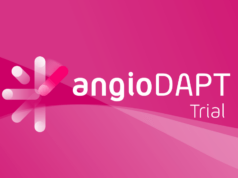
During a late-breaking science session at the European Society of Cardiology (ESC) congress (26–30 August, Barcelona, Spain), Pim Tonino (Heart center Catharina Hospital, Eindhoven, the Netherlands) reported that outcomes with a titanium-nitride-oxide coated stent (Optimax, Hexacath) is non-inferior to those of a everolimus-eluting stent with a biodegradable polymer (Synergy, Boston Scientific) in patients with acute coronary syndrome undergoing percutaneous coronary intervention (PCI).
Conducted in 12 international sites, the TIDES-ACS study randomised 1,491 acute coronary syndrome patients (2:1) to receive either Optimax (989) or Synergy (502). The primary endpoint was the rate of major adverse cardiac events (MACE): a composite of cardiac death, non-fatal myocardial infarction and ischemia-driven target lesion revascularisation at 12 months.
The primary endpoint occurred in 6.3% of patients receiving Optimax vs. 7% of those receiving Synergy (p for non-inferiority <0.001; p for superiority=0.66).
Both cardiac death (0.5% vs. 1.6%, respectively; p=0.04) and non-fatal myocardial infarction (1.8% vs. 4.6%, respectively; p=0.004) were observed less frequently with Optimax. However, ischemia-driven target lesion revascularisation was undertaken more frequently in the Optimax stent arm (5.4% vs. 3.4%, respectively; p=0.09).
“The TIDES-ACS results show us that the OPTIMAX nitride-oxide coated stent is non-inferior in patients with acute coronary syndrome compared to one of the top drug-eluting stents (SYNERGY) used in current interventional cardiology,” explained Tonino. He added: “When you look at the individual components of the primary endpoint in this study, the Optimax stent comes with a lower rate of cardiac death and myocardial infarction compared to SYNERGY, which is outbalanced by a higher rate of ischaemia-driven target lesion revascularisation for OPTIMAX. In other words, with the Optimax stent hard clinical endpoints like myocardial infarction and cardiac death are less frequent in acute coronary syndrome patients than with Synergy, at the cost of a, probably less important, higher rate of repeat intervention.”













